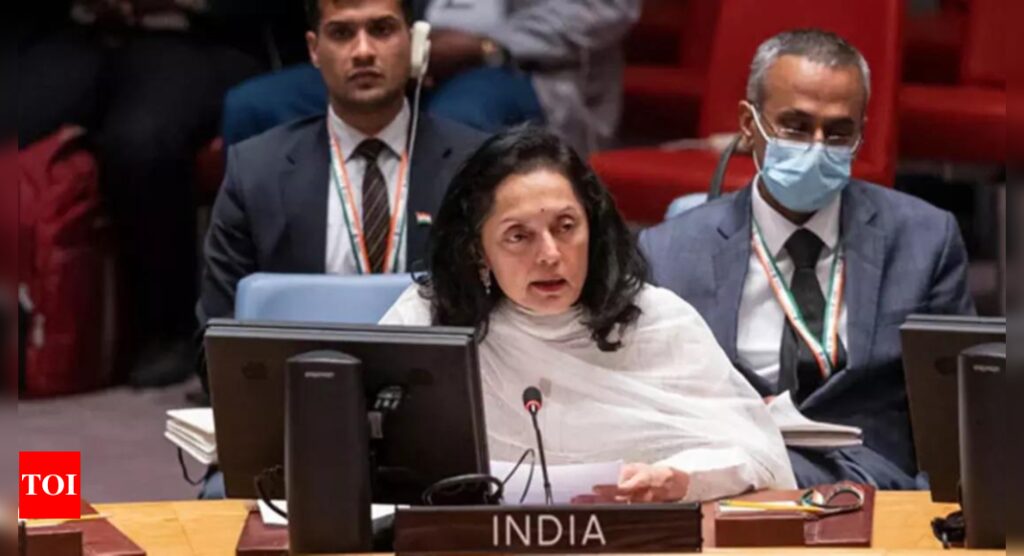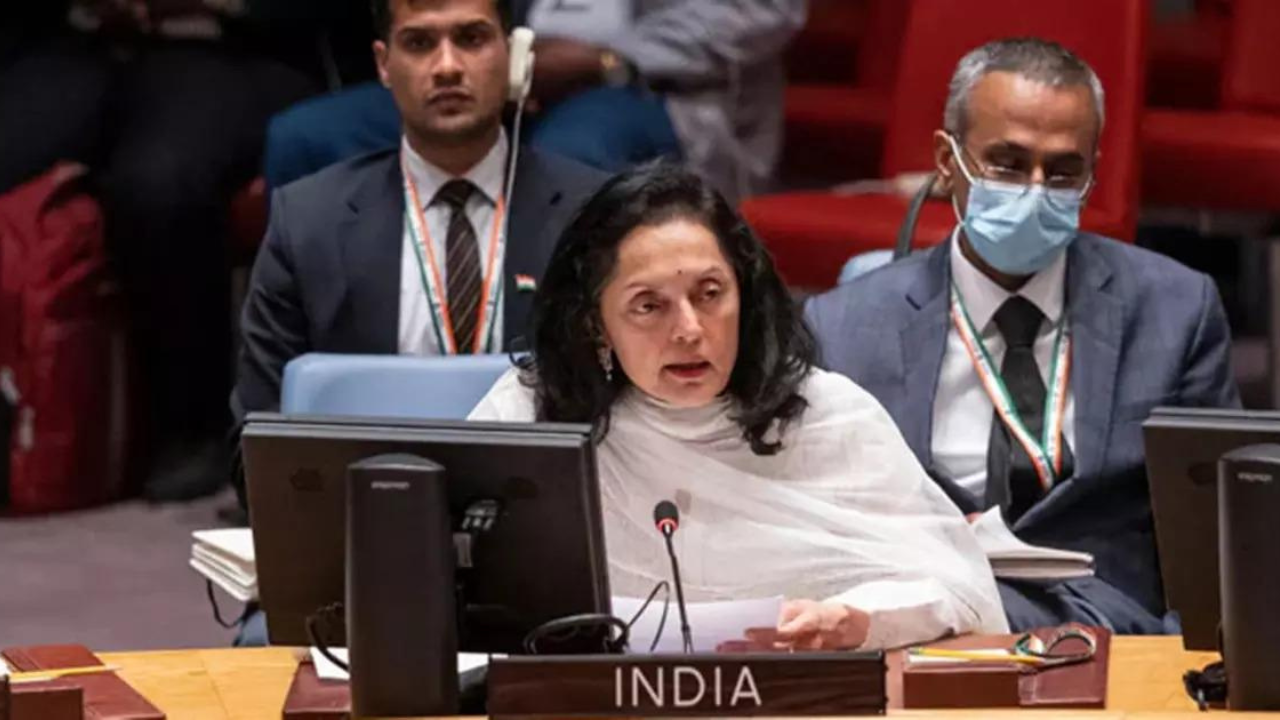[ad_1]
NEW YORK: India has emphasised the need to address growing state complicity in suppressing the activities of transnational criminal groups, India’s Permanent Representative to the United Nations Ruchira Kamboj said on Thursday (local time).
Speaking at a United Nations Security Council debate on ‘Threats to International Peace and Security: Transnational Organized Crime, Growing Challenges and New Threats’, Kamboj called for action against some states that continue to provide safe havens to offenders of crime syndicates.
Kamboj said, “We need to address growing political or state complicity in suppressing the activities of transnational criminal groups.”
“Some states continue to provide support, and safe havens to offenders of crime syndicates who have not only committed serious crimes but also continue to harm the economies of their adversary-States, through means such as counterfeiting and the dissemination of the currency of the adversary-State, supply of arms, drugs and other means to support terror activities across the border. Actions of such states should be held accountable,” she added.
Recalling Prime Minister Narendra Modi‘s remarks at the 90th INTERPOL General Assembly in New Delhi last year, she noted that he underscored the urgent need for collective action from the international community to counter transnational organised crime and terrorism.
Further, in her remarks, Kamboj said many nations give economic citizenship to criminal and economic offenders. She stressed that such states should fulfil their obligations under the concerned resolutions of the UNSC.
She stated that India remains committed to strengthening the international community’s endeavours to curb the escalating threats of organised crime and terrorism, ensuring that the collective response is effective and sufficient.
Speaking about the nations providing economic citizenship to criminals and economic offenders, Kamboj said, “Many states award economic citizenship to criminal and economic offenders providing sanctuaries in order to evade their arrest and extradition to other countries, in return for such criminals bringing foreign currency deposits to the State-accomplice. This should stop.”
“Such states should fulfil their obligations under the concerned resolutions of the Security Council, which affirms this as a primary responsibility of Member States in the endeavour to prevent, and counter terrorist acts,” she added.
Kamboj noted that member states that suffer due to poor governance and inadequate oversight of financial institutions are more vulnerable to exploitation by terrorist entities and organized criminals.
She called for the implementation of recommendations of the Financial Action Task Force in strengthening the governance structures of financial and economic assets to counter the menace.
Kamboj said, “if the trillion-dollar question is to ensure peace, do we have a peace infrastructure representative of the current times and contemporary realities? Or, is 2023 the new 1945? Will 1945’s security plumbing work today? Clearly, the UNSC of yesterday is always late today!”
She called for a need to work towards enhancing cooperation among law enforcement and governments around the world in intelligence gathering and sharing and deterrent measures. She stated that cooperation in the legal processes such as effective freezing of the proceeds of crime, early return of offenders and the efficient repatriation of the proceeds of crime should be enhanced and streamlined.
Kamboj called for setting up a common platform for sharing experiences and best practices, including successful cases of extradition, gaps in existing systems of extradition and legal assistance.
“The Principles of the United Nations Convention Against Corruption (UNCAC), the United Nations Convention Against Transnational Organized Crime (UNOTC), especially areas related to “International Cooperation” should be fully and effectively implemented,” India’s permanent representative at the UN added.
Kamboj also underlined the need to invest in technological capabilities and foster innovation, saying that it is vital to staying ahead in the battle against organised crime.
She stated further that the creation of tools to track and combat cyber threats, disrupt illicit financial flows, and improve border security measures are essential components of this technological response.
Speaking at a United Nations Security Council debate on ‘Threats to International Peace and Security: Transnational Organized Crime, Growing Challenges and New Threats’, Kamboj called for action against some states that continue to provide safe havens to offenders of crime syndicates.
Kamboj said, “We need to address growing political or state complicity in suppressing the activities of transnational criminal groups.”
“Some states continue to provide support, and safe havens to offenders of crime syndicates who have not only committed serious crimes but also continue to harm the economies of their adversary-States, through means such as counterfeiting and the dissemination of the currency of the adversary-State, supply of arms, drugs and other means to support terror activities across the border. Actions of such states should be held accountable,” she added.
Recalling Prime Minister Narendra Modi‘s remarks at the 90th INTERPOL General Assembly in New Delhi last year, she noted that he underscored the urgent need for collective action from the international community to counter transnational organised crime and terrorism.
Further, in her remarks, Kamboj said many nations give economic citizenship to criminal and economic offenders. She stressed that such states should fulfil their obligations under the concerned resolutions of the UNSC.
She stated that India remains committed to strengthening the international community’s endeavours to curb the escalating threats of organised crime and terrorism, ensuring that the collective response is effective and sufficient.
Speaking about the nations providing economic citizenship to criminals and economic offenders, Kamboj said, “Many states award economic citizenship to criminal and economic offenders providing sanctuaries in order to evade their arrest and extradition to other countries, in return for such criminals bringing foreign currency deposits to the State-accomplice. This should stop.”
“Such states should fulfil their obligations under the concerned resolutions of the Security Council, which affirms this as a primary responsibility of Member States in the endeavour to prevent, and counter terrorist acts,” she added.
Kamboj noted that member states that suffer due to poor governance and inadequate oversight of financial institutions are more vulnerable to exploitation by terrorist entities and organized criminals.
She called for the implementation of recommendations of the Financial Action Task Force in strengthening the governance structures of financial and economic assets to counter the menace.
Kamboj said, “if the trillion-dollar question is to ensure peace, do we have a peace infrastructure representative of the current times and contemporary realities? Or, is 2023 the new 1945? Will 1945’s security plumbing work today? Clearly, the UNSC of yesterday is always late today!”
She called for a need to work towards enhancing cooperation among law enforcement and governments around the world in intelligence gathering and sharing and deterrent measures. She stated that cooperation in the legal processes such as effective freezing of the proceeds of crime, early return of offenders and the efficient repatriation of the proceeds of crime should be enhanced and streamlined.
Kamboj called for setting up a common platform for sharing experiences and best practices, including successful cases of extradition, gaps in existing systems of extradition and legal assistance.
“The Principles of the United Nations Convention Against Corruption (UNCAC), the United Nations Convention Against Transnational Organized Crime (UNOTC), especially areas related to “International Cooperation” should be fully and effectively implemented,” India’s permanent representative at the UN added.
Kamboj also underlined the need to invest in technological capabilities and foster innovation, saying that it is vital to staying ahead in the battle against organised crime.
She stated further that the creation of tools to track and combat cyber threats, disrupt illicit financial flows, and improve border security measures are essential components of this technological response.
[ad_2]
Source link











More Stories
Congress replaces Kamal Nath, names an OBC as Madhya Pradesh chief | India News
Fire breaks out in ITBP camp in Srinagar; none hurt | India News
Parliament Security: Co-villagers give clean chit to Lalit Jha, parents to move court | India News